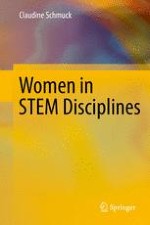2017 | Supplement | Buchkapitel
3. Catching Up: Middle East North Africa, Sub-Saharan Africa and South-West Asia
verfasst von : Claudine Schmuck
Erschienen in: Women in STEM Disciplines
Aktivieren Sie unsere intelligente Suche, um passende Fachinhalte oder Patente zu finden.
Wählen Sie Textabschnitte aus um mit Künstlicher Intelligenz passenden Patente zu finden. powered by
Markieren Sie Textabschnitte, um KI-gestützt weitere passende Inhalte zu finden. powered by
